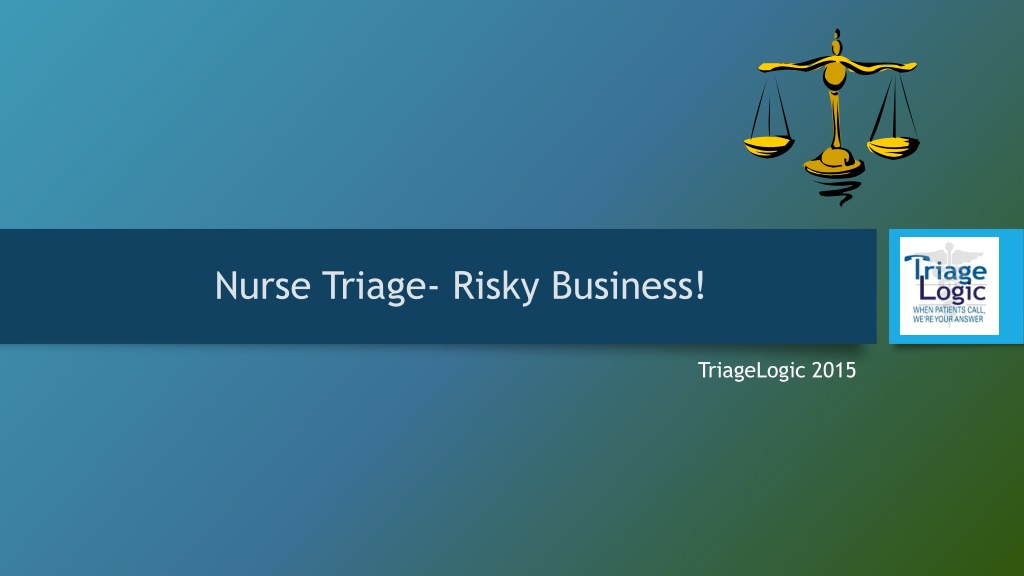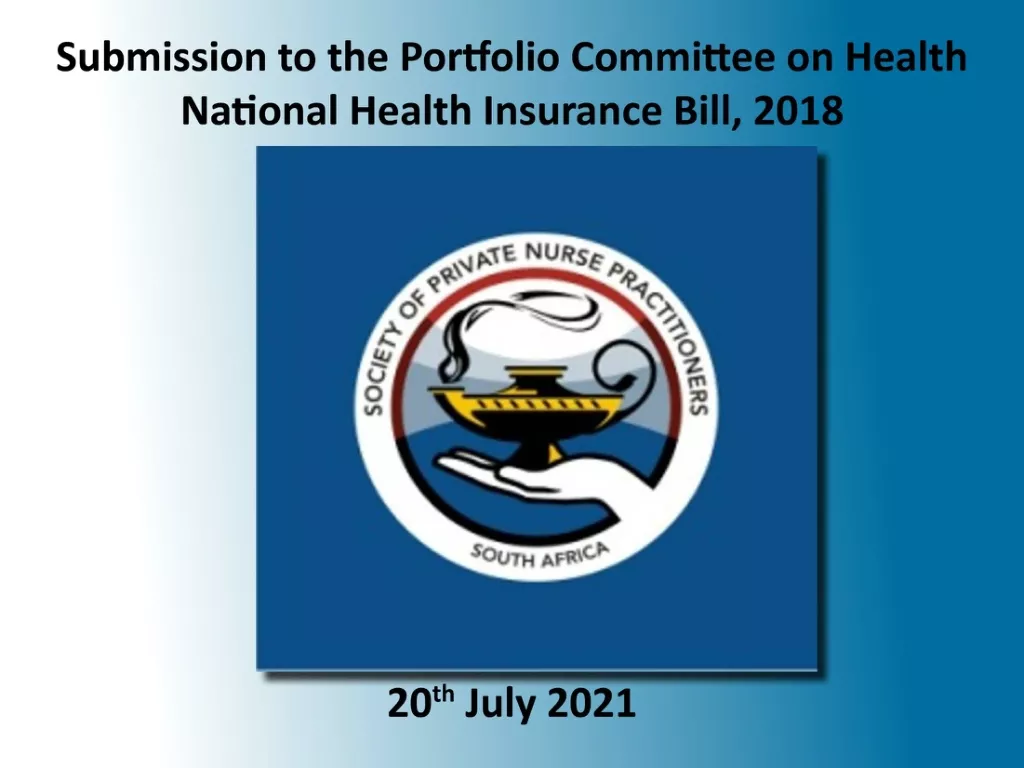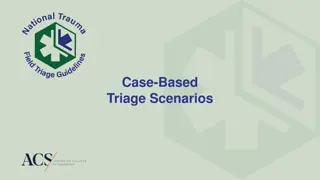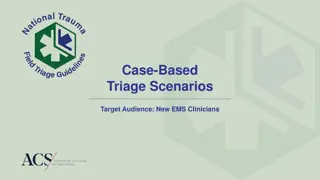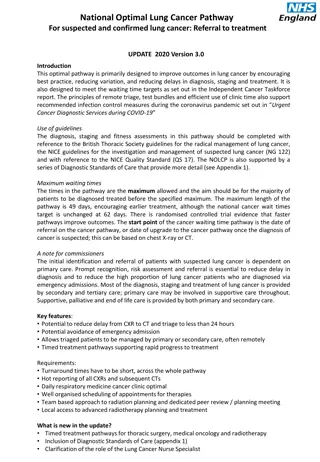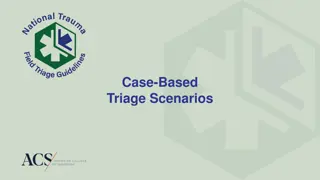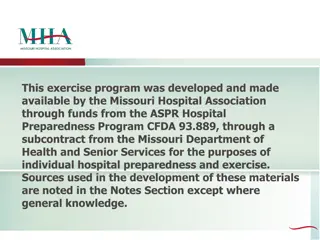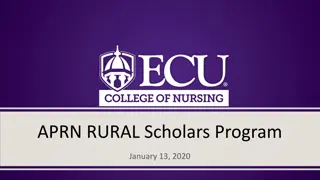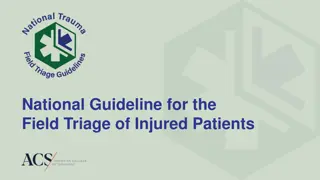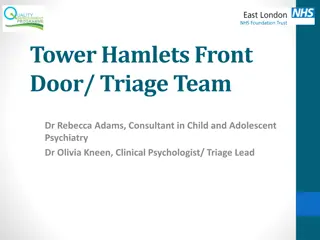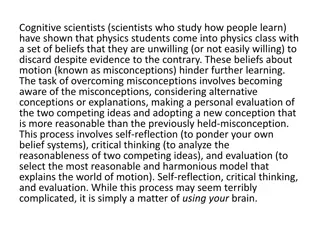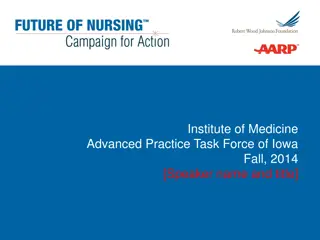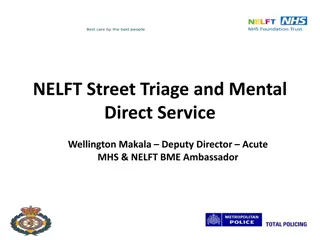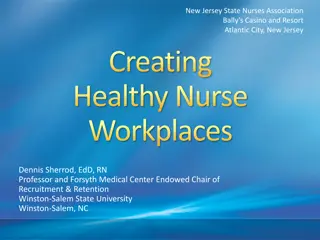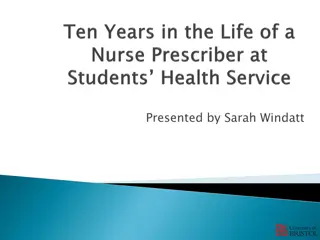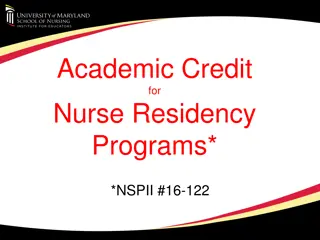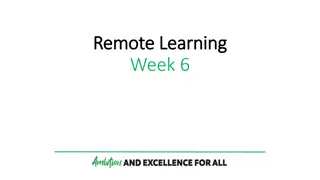Understanding Nurse Triage: Common Misconceptions and Legal Issues
Explore the world of nurse triage with insights on misconceptions, legal considerations, and the crucial role of teletriage nurses. Learn about risk mitigation, the nurse's scope of practice, and the importance of communication in teletriage encounters.
Download Presentation

Please find below an Image/Link to download the presentation.
The content on the website is provided AS IS for your information and personal use only. It may not be sold, licensed, or shared on other websites without obtaining consent from the author. Download presentation by click this link. If you encounter any issues during the download, it is possible that the publisher has removed the file from their server.
E N D
Presentation Transcript
Nurse Triage- Risky Business! TriageLogic 2015
In this Course: You will learn: Some common misconceptions of teletriage The goal of any patient encounter Legal issues pertaining to Nurse Triage How to minimize your risks
Nurse Triage Misconceptions: We are not gatekeepers - All nurses are advocates for their patients, teletriage nurses are not different- we never stand in the way of a patient speaking with their physician. Providing Symptom Diagnosis- Diagnosing is outside of the scope of practice for ANY nurse, teletriage nurses are no exception. Nurses that are "winging it -We follow algorithms that were approved by our medical director. We do work under the supervision of MD s at all times.
What we are NOT, continued Robotic Messengers -We are intelligent, knowledgeable, highly trained RN s working in a unique nursing specialty. Telemarketers- Nurse Triage nurses are not selling anything to our patients.
Goal of Nurse Triage By following specialized protocols teletriage nurses work with patients to develop a plan of action , getting them the most appropriate care in the most appropriate place, at the right time by the safest route.
Legal issues All medical professionals practice their jobs with some risk, nurses are no exception. The teletriage nurse must be sure and practice nurses as a prudent nurse would do in a similar situation. Terms to remember: Negligence- In Teletriage it is defined as failure to communicate significant information in a timely manner to the physician or patient The relationship btw the patient and nurse begins the moment the nurse answers phone. Abandonment: -when a professional terminates the relationship without providing adequate replacement.
Areas of potential risk Practicing outside the scope of nursing -happens when nurses start making diagnoses. Nurses can form a nursing impression or working diagnosis. We triage, NOT diagnose. Delay or denial of care- If the disposition is See in ED Now, the patient can NOT wait 4 hrs- They must go NOW Assure patient knows seriousness of not following recommended disposition- The nurse must apprise callers of the seriousness of the symptoms they are describing in order to motivate them to seek the appropriate level of care in a timely manner.
What the Nurse is responsible to do: It is the nurses responsibility to ask the questions to elicit responses from their patients in order to determine the most appropriate protocol and disposition to use.
If the disposition is 911 or ED be sure to ask: I need you to call 911 now- will you do that? This could be a life threatening emergency- will you go to the ED in the next hour? And be sure to document the patients response.
Most lawsuits are brought about d/t delay of care. A delay of care occurs when a patients symptoms worsen, and the patient has not adequately been advised to seek treatment in time to prevent injuries or even death.
What puts a unit at risk for delay of care? Short staffed - call volume is usually heavier on Monday, Fridays, after 3 day holidays and during cold/flu Staff that is underqualified average of 5 years of nursing experience, good judgment and critical thinking skills. Telephone charisma-good teaching skills, integrity, professionalism, resourcefulness Inadequate Training Not using the protocols as written, not following the protocols correctly
What puts a nurse at risk: Nurse did not take the time to elicit enough information to make an informed decision Ask Questions!-nurse must ask enough questions to make an informed decision/adequate assessment sloppiness. The nurse must be vigilant on the phone. Health history, medications, allergies, chronic diseases ALL factor into your decision Documentation if it s not written, it wasn t said! Choosing the wrong Protocol-be sure to review the see other guideline section and read the description/definition of each protocol.
Use Your Critical Thinking skills 2 most important things a teletriage nurse can do is to: Use his/her Critical thinking skills and LISTEN. The elderly and pediatric clients often present with atypical symptoms. The Nurse should be aware of subtle clues and ask more questions. Rationale: their immune systems are not fully developed (pediatric) or are starting to break down (elderly). These patients often present in atypical ways
Assessing Newborns and the Elderly: What to ask ADL: Compare now with what is normal for patient. Intake (liquid and food) Output (urine, BM, emesis, diaphoresis) Sleeping (too much, too little) Activities: disinterested in usual activities Mood (marked changes) Color (pale, red, blue, grey, ashen)
Why do nurses get sued? Failure to use a systematic approach or process. Teletriage follows the Nursing Process! Failure to use (or improper use of) protocols/guidelines Failure to make safe disposition-within a timely manner Failure to communicate significant information in a timely manner to patient or physician
Reducing risk Use a Systematic Approach such as standardized protocols Use the protocols as intended- do not miss or skip questions Document: Who/What/Where/When/Why and any pertinent negatives. Use the patients words with quote marks Use only approved abbreviations and terms Always document time frames and ETA s IF IT WASN T DOCUMENTED--- IT WASN T SAID!
POP QUIZ! What is the first question you should ask after verifying that you are speaking with the patient or parent to the patient (if a minor)? ANSWER: IS THE PATIENT STABLE TO CONTINUE WITH TRIAGE?
The most frequently misdiagnosed conditions that lead to malpractice are Ectopic Pregnancies, MI, Appendicitis
Rules of Thumb (ROT) Many Professions, including nursing use ROT s all the time. They are part of our critical thinking, judgment, instinct and even learned from our mentors as nursing students. Definition: A method or procedure based on experience and common sense. Not necessarily scientifically accurate.
A few examples of common Rules of Thumb Kids get sicker quicker Once an ectopic, always an ectopic (until ruled out by a medical provider) Chest Pain is Cardiac until ruled out. Any pain btw the neck and navel should be triaged as Chest Pain. Can you think of others that you have learned over the years?
TIMELY ACCESS to CARE Be sure to direct the patient to the nearest/safest and most prudent facility. Directing a patient with moderate to severe asthma symptoms to an ED > 1 hour away may result in severe complications!
Nursing Judgment/Intuition No Protocol can provide all the answers. Teletriage Nurses rely heavily on their nursing experience, judgment and intuition. You must engage ALL of your senses to assure your patients are safe and all reach the appropriate level of care. Never assume that all vomiting is the stomach flu, all coughs are just colds or all bumps on the head are benign!
What are 2 common misconceptions of a Teletriage Nurse?
Answers can include: 1. The nurse is a gatekeeper blocking the patient from reaching their physician. 2. The teletriage nurse is winging it . 3. Teletriage Nurses can diagnose patients. 4. We are all robotic message takers for the physicians. 5. Teletriage Nurses are telemarketers
True or False? When giving report to a physician it is okay to skip over some information? The doctor is busy and will probably think the nurse is chatty if she gives a thorough report of her assessment.
FALSE Always give the physician a concise but thorough report of your pertinent assessment findings.
Finish this statement- If it wasnt documented _________________________!
